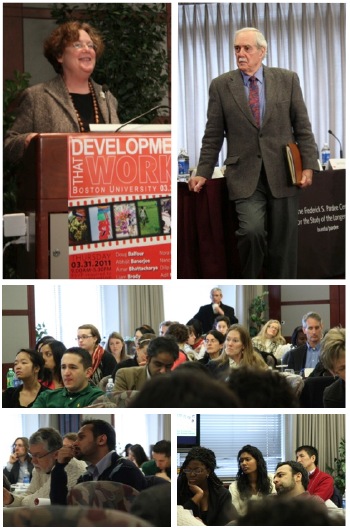Pardee Center Holds Conference on “Development That Works”

More than 100 people participated in the Frederick S. Pardee Center for the Study of the Longer-Range Future’s annual conference on Thursday, March 31, called Development That Works. The conference was held at the Boston University School of Management Conference Center.
The all-day conference was organized by the Pardee Center in collaboration with the Boston University Global Development program. Members of the organizing committee for the conference, who also served as session chairs, included Prof. Kevin Gallagher (International Relations), Prof. Dilip Mookherjee (Economics), Prof. Jonathon Simon (Center for Global Health and Development), and Prof. Adil Najam (Pardee Center). The conference was kicked off with a reception for panelists the previous evening.
The conference included a special lunchtime program, which included an address by Dean Virginia Sapiro, the Dean of the Boston University College of Arts & Sciences, and a tribute recognition of BU Economics Professor John R. Harris, a development economist whose landmark 1970 paper on migration, unemployment, and development was recently selected as one of the top 20 papers published by the American Economic Review in the past 100 years.
In her address, Dean Sapiro highlighted the importance of the conference and the work of the Pardee Center as examples of cross-disciplinary collaboration and research. In introducing Prof. Harris, she said, “This is a great honor and recognizes [Prof. Harris’s] work in economics as among the very best in the field and seminal in its impact in development economics.” Prof. Harris then spoke about how that work came about, its policy impact, and its continuing relevance, including to the discussions at the conference.

The four panels at the Development That Works conference featured 13 leading scholars and practitioners; they discussed their work related to various aspects of development based on examples and experiences from around the world. Speaking on topics such as the global development policy programs of agencies such as The World Bank and local programs delivering education, health, and poverty alleviation services to rural villages in Africa and Asia, the speakers highlighted the challenges of creating programs that both achieve the intended results and can be sustained over time. Lively question-and-answer sessions followed each panel discussion, providing an opportunity for the many development scholars, practitioners, and students in the audience to interact with the presenters.

After opening remarks from Prof. Adil Najam (Pardee Center) and Prof. Kevin Gallagher (BU Global Development), the first panel discussed issues related to Global Economic Governance. The panel was chaired by Prof. Kevin Gallagher (BU International Relations), and panelists included Robert Wade (Professor of Political Economy and Development, London School of Economics), Gerald Epstein (Professor and Chair of Economics and Co-director of Political Economy Research Institute, University of Massachusetts, Amherst), and Amar Bhattacharya (Director, G-24). The speakers focused on global economic institutions and the global economic architecture and how it would affect global development, particularly in the post-financial-crisis world and a future characterized by the rise of emerging economies.

The second panel was called Investing in Development That Works and was chaired by Jonathon Simon (Professor of International Health and Director, Center for Global Health & Development, Boston University). Speakers included Nancy MacPherson (Managing Director, Evaluation, The Rockefeller Foundation), Iqbal Z. Quadir (Professor of Practice of Development & Entrepreneurship, and Founder and Director of The Legatum Center, Massachusetts Institute of Technology), and Doug Balfour (Chief Executive Officer, Geneva Global). This panel discussed the qualities needed to seed development through philanthropy and for enterprise and innovation.

The third panel of the day focused on Social Enterprise and was chaired by Adil Najam (Frederick S. Pardee Professor of Global Public Policy and Director, The Pardee Center, Boston University). The speakers on this panel included Una Ryan (Chief Executive Officer, Diagnostics for All), Liam Brody (Senior Vice President, Root Capital), Kabir Kumar (Microfinance Analyst, Consultative Group to Assist the Poor), and Calestous Juma (Professor of the Practice of International Development and Director of the Science, Technology, and Globalization Project, Harvard Kennedy School). This panel showcased learning and experience on social enterprise and innovation for development, and speakers highlighted developments in a range of areas, including healthcare for the poor, the environment, finance, telecommunication, and agriculture.

The fourth and final session of the day brought together a panel of leading economists looking at the evidence on Economic Development to discuss lessons about development that works. The panel was chaired by Dilip Mookherjee (Professor of Economics and Director of the Institute for Economic Development, Boston University), and speakers included Abhijit V. Banerjee (Ford Foundation International Professor of Economics and Director of Abdul Latif Jameel Poverty Action Lab, Massachusetts Institute of Technology), Mark Rosenzweig (Frank Altschul Professor of International Economics and Director, Economic Growth Center, Yale University), and Asim Ijaz Khwaja (Professor of Public Policy, Harvard Kennedy School). This panel discussed the state of knowledge and evidence on the impact of development interventions and highlighted the need for deeper and more systematic inquiry into this evidence.
A conference report will be published by the Pardee Center later this year, and videos of the entire event are available on the Pardee Center Multimedia page. A report of the reception for panelists held the evening before the conference is available here. A report of the conference published in The Daily Free Press.